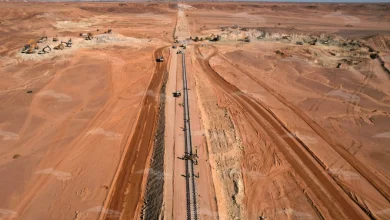Algiers, Algeria – Algerian customs officials have intercepted a staggering 16.28 million hallucinogenic tablets in the first nine months of 2025, marking a dramatic 149.2% increase compared to the same period last year. The seizures highlight a growing concern over drug trafficking and its impact on public health and national security within Algeria. These figures were released by the General Directorate of Customs, underscoring their commitment to combating illicit trade and protecting Algerian society.
The seized narcotics were discovered in 313 separate cases, leading to the arrest of 523 individuals suspected of involvement in drug trafficking. In the corresponding period of 2024, authorities confiscated 6,534,476 tablets, a significantly lower amount that underscores the escalating scale of the problem. The significant surge in seizures points to a possible increase in drug trafficking activities and increased effectiveness of Algerian customs enforcement agencies.
The General Directorate of Customs attributes the substantial increase in seizures to intensified monitoring and targeting operations, particularly in border regions, logistical platforms, and other sensitive areas across the country. The Directorate stated, “These results reflect the intensification of monitoring and targeting operations, especially at the level of border areas, logistical platforms and sensitive points across the country.” They also highlighted the effectiveness of advanced analysis, risk management systems, enhanced operational capabilities of customs teams, and strengthened coordination with various security agencies as contributing factors.
According to the customs report, the largest quantities of seized tablets were recorded in the regional directorates of Ouargla (3.95 million tablets), Illizi (3.88 million tablets), Setif (1.92 million tablets), and Chlef (1.82 million tablets). This geographical distribution suggests heightened vigilance and proactive measures taken by customs teams in these strategically important regions. The concentration of seizures in these areas also indicates potential trafficking routes and source points for the drugs. Ouargla and Illizi, being located in southern Algeria, are strategically vital due to their proximity to neighboring countries and porous borders, which are sometimes exploited by criminal networks to smuggle illicit goods. Setif and Chlef, located in the interior of the country, likely serve as transit points for the distribution of drugs to other regions.
The General Directorate of Customs reiterated its unwavering commitment to combating all forms of illicit trade, protecting society, and actively contributing to the strengthening of national security. The statement emphasizes the importance of continued vigilance and collaborative efforts between customs officials, security forces, and other relevant agencies to effectively address the challenges posed by drug trafficking.
The rise in drug seizures raises several critical questions about the sources, routes, and destinations of these illicit substances. It prompts a deeper examination of the socio-economic factors that contribute to drug trafficking and abuse within Algeria. Experts suggest that a multi-faceted approach is needed to effectively combat the problem, including strengthening border security, enhancing law enforcement capabilities, implementing public awareness campaigns, and providing treatment and rehabilitation services for drug addicts.
For more information about Algeria, check our dedicated section.
The Algerian government has been actively working to strengthen its anti-drug trafficking efforts in recent years. This includes investing in modern technology, training customs officials, and cooperating with international partners to share intelligence and best practices. The recent increase in drug seizures is a testament to these efforts, but it also underscores the need for continued vigilance and proactive measures to stay ahead of criminal networks.
The fight against drug trafficking is a complex and ongoing challenge that requires a comprehensive and coordinated response. The Algerian government, with the support of its citizens and international partners, is determined to protect its society from the harmful effects of drug abuse and ensure a safe and secure future for all. DZWatch will continue to monitor the situation and provide updates on the government’s efforts to combat drug trafficking and protect public health.
Several factors may contribute to the increase in the trafficking of hallucinogenic drugs into Algeria. Political instability in neighboring countries, for instance, can create opportunities for criminal networks to flourish and expand their operations. Economic hardship and unemployment can also drive individuals to engage in illegal activities, including drug trafficking, as a means of survival. Furthermore, the increasing availability of synthetic drugs and the ease with which they can be produced and transported pose a significant challenge to law enforcement agencies. The ongoing conflict in the Sahel region, in particular, has been identified as a potential source of instability and a conduit for the flow of illicit goods, including drugs.
To effectively address these challenges, the Algerian government must adopt a holistic approach that combines law enforcement efforts with social and economic development programs. This includes creating employment opportunities, improving education and healthcare services, and providing support for vulnerable communities. It is also essential to strengthen regional cooperation and intelligence sharing to disrupt transnational drug trafficking networks. By addressing the root causes of drug trafficking and investing in sustainable development, Algeria can create a more secure and prosperous future for its citizens. The Algerian government must prioritize the fight against drug trafficking, not only as a law enforcement issue but as a matter of public health and national security. This requires a comprehensive and coordinated response that involves all sectors of society, from law enforcement agencies to healthcare providers to community organizations. Only through a sustained and collaborative effort can Algeria effectively combat the scourge of drug trafficking and protect its citizens from its harmful effects.




